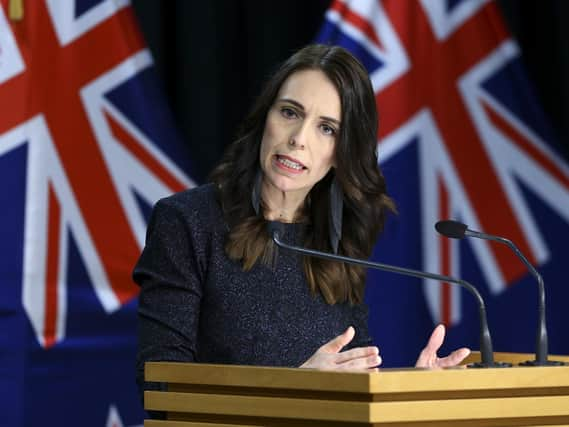Letters - Monday, October 5 2020


Governments around the world are having to make stark choices. Do we save lives, or do we save jobs and the economy?
Most have tried to strike a balance by trying to keep the economy moving as much as possible while trying to minimise the number of lives lost to Covid-19, with varying degrees of success.
Advertisement
Hide AdAdvertisement
Hide AdFour years ago, we moved from the Fylde to New Zealand to be near our daughter and, while I have fond memories of my home town, I am very grateful that I live here at the moment.
The New Zealand Government decided that, as a principle, lives were more important than the economic implications of the pandemic.
They followed the advice of epidemiologists and set about eliminating the virus from the community.
They closed the borders to all but returning residents and citizens, initially requiring them to self isolate at home for 14 days but when the numbers of returnees dropped to manageable proportions, they paid for those still coming back to be isolated in specific hotels in the main centres, testing on day three and day twelve of their stay.
Advertisement
Hide AdAdvertisement
Hide AdIf they were still negative after 14 days, they were free to join the wider community.
Anyone who tested positive during these two weeks were immediately moved to a quarantine facility where they were treated and tested until they no longer were a risk to the community. Close contacts who had travelled with the cases were similarly quarantined.
Meanwhile, testing in the community continues throughout the country and anyone with symptoms is encouraged to get tested.
As a result of this, some small clusters have come to light but they have been rigorously managed with contact tracing and those cases moved into quarantine facilities.
Advertisement
Hide AdAdvertisement
Hide AdThe net result of all this is that New Zealand is pretty much clear of the virus in the community, although we get cases at the borders. We are at the stage now where we can go about our normal lives within our borders. Parts of the economy have suffered and will continue to suffer, especially those linked with travel and tourism. Overseas holidays are impossible but Kiwis are rediscovering the beauties of their homeland and, with care and control at the borders, we can continue like that until a vaccine is available.
The overall economy is picking up with exports of agricultural products and timber doing well. Service industries are finding it more difficult but are coming up with creative ways to stay in business.
I don’t think I would have had such an optimistic outlook if I still lived in Lytham.
Bob Jones
Hamilton, New Zealand
Education
Too many pupils did not get support
To avoid a repetition of this year’s assessment fiasco it is very likely that in 2021 A -level examinations will be held later than normal. Mid July is being considered by the Education Secretary and Ofqual. This is to enable students to catch up on work missed because of school closures earlier this year.
Advertisement
Hide AdAdvertisement
Hide AdDuring this period research shows that far too many students, regrettably, did not receive the consistent and high grade help they deserved while at home. Some received none. Homework was not set and frequently if set not marked. This was inexcusable.
Hence, from mid October this year schools will legally have to provide high quality and consistent teaching to students who are self-isolating at home. Thousands more laptops are being made available for disadvantaged students.
There can now be no excuse for failure to provide students with the knowledge and help they require for their future careers.
The techniques of distance learning on line is now basic. The Open University, for example, has been providing superb distance learning for many years.
Dr Barry Clayton
Thornton Cleveleys
Economy
Equal treatment to save jobs
Advertisement
Hide AdAdvertisement
Hide AdThe UK is facing two major events over the next five months, the virus problem and Brexit.
Both impact on economic activity, especially employment.
In the long term, the loss of jobs in the epidemic may in effect benefit from positive outcomes with Brexit, as we face the reality of the adjustment to our economy and the way of life, what we eat, the way we travel, the way we work and leisure that come with the shock of extracting ourselves from the EU.
How we handle this change will affect the stability and cohesion of our society in the coming years.
Sadly, our last 10 years in the EU has increased inequity and, as a result, a lack of dialogue and cohesion in our society.
Advertisement
Hide AdAdvertisement
Hide AdI am so alarmed by some of the policies of the Government around employment I am making this observation.
From my view, retraining of the workforces needs to be inclusive of all the people in our society, including the disabled and those with mental health issues, and should be seen as an opportunity to rid us of some of the prejudices that have entrenched people labelled with such disabilities in a state of long-term exclusion from our society.
The hope of Brexit for this has been dashed by what I see on the BBC (September 25).
A jobs scheme aimed at preserving some jobs but not all. That is protecting the select few and disregarding the rest.
Equality of treatment is needed to save us, not the reckless division caused by social selection in the distribution of funds that this work scheme represents.
Bruce Murray
via email
Comment Guidelines
National World encourages reader discussion on our stories. User feedback, insights and back-and-forth exchanges add a rich layer of context to reporting. Please review our Community Guidelines before commenting.